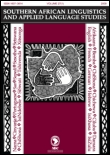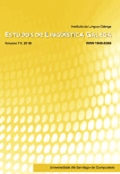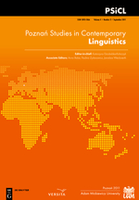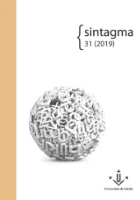
Emakeele Seltsi Aastaraamat-The Yearbook of the Estonian Mother Tongue Society
Scope & Guideline
Preserving Linguistic Heritage, One Year at a Time
Introduction
Aims and Scopes
- Linguistic Studies:
The journal publishes research that delves into the grammatical, phonological, and syntactic aspects of the Estonian language, contributing to a deeper understanding of its structure and usage. - Language and Culture:
It explores the interplay between the Estonian language and its cultural context, including studies on toponyms, ethnolinguistic identities, and historical language use. - Language Education and Acquisition:
Research focused on the methodologies and practices of teaching Estonian as both a mother tongue and a second language, including innovative approaches to language learning. - Etymology and Lexicology:
The journal frequently presents studies on the origins and meanings of Estonian words and phrases, contributing to the field of etymology and expanding the lexicon of Estonian. - Interdisciplinary Approaches:
The journal encourages interdisciplinary studies that combine linguistics with other fields such as sociology, psychology, and education, highlighting the relevance of language in various contexts.
Trending and Emerging
- Gamification in Language Learning:
There is an increasing emphasis on gamified learning approaches, particularly in the context of adult education, which highlights innovative methods for engaging learners in the Estonian language. - Cognitive and Perceptual Linguistics:
Themes exploring the cognitive aspects of language perception and usage are gaining traction, indicating a burgeoning interest in understanding how individuals process and produce language. - Influence of Technology on Language Use:
Research addressing the impact of technology, including digital communication, on language practices is emerging, reflecting contemporary shifts in how languages are used in the digital age. - Language Needs of International Students:
Studies focusing on the language requirements and integration of international students in Estonian educational contexts are on the rise, highlighting the relevance of the Estonian language in a globalized environment.
Declining or Waning
- Historical Linguistics:
Research that focuses on the historical evolution of the Estonian language and its comparative studies with other languages has seen a decline, indicating a possible shift towards more contemporary language studies. - Traditional Dialect Studies:
The exploration of regional dialects and traditional language forms is becoming less frequent, suggesting a possible move towards standard language and modern usage. - Sociolinguistic Studies of Minority Languages:
There has been a noticeable reduction in papers addressing the sociolinguistic dynamics of minority languages within Estonia, potentially indicating a narrowing focus towards the Estonian language itself.
Similar Journals

Southern African Linguistics and Applied Language Studies
Exploring the Rich Tapestry of Southern African LanguagesSouthern African Linguistics and Applied Language Studies is a prestigious journal dedicated to the exploration and analysis of linguistics and applied language studies within the Southern African context. Published by Taylor & Francis Ltd, this esteemed journal has established itself as a significant platform for scholars and practitioners since its inception in 2003. With an impressive Q2 ranking in the Linguistics and Language category and a current Scopus rank of #430 out of 1167, it occupies a vital position in the academic landscape, appealing to a diverse readership keen on linguistic research, language policy, and applied linguistics. While the journal is not currently open access, it provides comprehensive insights and scholarly articles that foster understanding and innovation in linguistic practices and language education. As of 2024, the journal continues to deepen its impact through rigorous peer-review and a commitment to advancing knowledge, making it a key resource for researchers, educators, and students seeking to navigate the complexities of language within the Southern African region and beyond.

Language and Linguistics
Pioneering Research in Language and LinguisticsLanguage and Linguistics is a leading academic journal published by ACAD SINICA, INST LINGUISTICS, based in Taiwan. Established in 2008, this journal has rapidly gained recognition within the field of linguistics, achieving a commendable ranking of Q2 in the 2023 category quartiles and holding positions in the top percentiles of Scopus rankings for both Arts and Humanities and Social Sciences. With an ISSN of 1606-822X and an E-ISSN of 2309-5067, the journal aims to foster the development of linguistics research by providing a platform for the dissemination of innovative and interdisciplinary studies. While it currently operates on a traditional subscription model, its significant contribution to the advancement of linguistic theory and its applications makes it an invaluable resource for researchers, professionals, and students alike. Spanning converged years from 2008 to 2024, Language and Linguistics continues to shape the dialogue in understanding language phenomena and encourages submissions that push the boundaries of current linguistic knowledge.

Lingua Italiana
Connecting Scholars and Enthusiasts of the Italian LanguageLingua Italiana is a distinguished journal published by FABRIZIO SERRA EDITORE, dedicated to the exploration and advancement of the Italian language in both its literary and linguistic contexts. With its ISSN 1724-9074 and E-ISSN 1826-8080, Lingua Italiana aims to foster scholarly dialogue among researchers, professionals, and students invested in Italian studies, linguistics, and cultural discourse. Located in Pisa, Italy, the journal provides a platform for rigorous peer-reviewed articles that reflect the latest research, theoretical frameworks, and critical analyses. Although it operates under a subscription model, the journal remains an invaluable resource due to its commitment to quality content and comprehensive coverage of contemporary issues affecting the Italian language. By contributing to Lingua Italiana, authors can not only enhance their academic footprint but also engage with a global audience interested in rich linguistic heritage and its evolution.

Estudos de Linguistica Galega
Unveiling the Nuances of Galician LinguisticsEstudos de Linguistica Galega, an esteemed journal published by the University of Santiago de Compostela, provides a critical platform for scholars engaged in the vibrant field of linguistics, particularly focusing on the Galician language and its surrounding linguistic phenomena. Launched in 2009, this Open Access journal enables unrestricted dissemination of research, facilitating engagement from a global audience. With an impact factor that positions it within the Q4 quartile in Linguistics and Language, it reveals a strong commitment to advancing the discourse in this niche. It ranks #691 out of 1088 in the Arts and Humanities category, underscoring its relevance in the academic landscape. The journal aims to foster collaboration and innovation among researchers and practitioners, making significant contributions to understanding linguistic diversity and its implications in contemporary society. Located in Santiago de Compostela, Spain, the journal encourages submissions that explore theoretical, empirical, and applied linguistic studies, thereby inviting researchers, professionals, and students to contribute to this growing field.

Poznan Studies in Contemporary Linguistics
Elevating linguistic insights for a global audience.Poznan Studies in Contemporary Linguistics, published by DE GRUYTER MOUTON, is a pivotal journal in the field of linguistics, with an ISSN of 0137-2459 and an E-ISSN of 1897-7499. Located in Germany, this esteemed journal has consistently contributed to the academic landscape since its inception. As of 2023, it holds a Q2 category rank in Linguistics and Language and boasts commendable Scopus rankings, featuring in the 69th percentile for Arts and Humanities and the 66th percentile for Social Sciences. The journal emerges as a vital platform for scholars to explore contemporary linguistic theories and practices, making it an essential resource for researchers, professionals, and students alike. With a converged publication period from 2007 to 2024, it aims to facilitate a deeper understanding of linguistic advancements and trends. While the journal currently does not offer open access, its rigorous peer-review process ensures the highest quality of published research, strengthening its role as a leading discourse in the dynamic field of linguistics.

Verba-Anuario Galego de Filoloxia
Celebrating the Richness of Language through Rigorous ResearchVerba-Anuario Galego de Filoloxia is a prominent academic journal published by UNIV SANTIAGO COMPOSTELA, dedicated to advancing the field of linguistics and language studies. Hailing from Spain, this journal provides a vital platform for researchers, educators, and students interested in Galician philology and its broader linguistic implications. Although it operates under traditional access models, the journal’s commitment to quality research is reflected in its categorization within Q3 in Linguistics and Language for 2023, showcasing its significant contributions to the field. Encompassing a convergence period from 2017 to 2024, Verba garners attention in both the Arts and Humanities and Social Sciences domains, with its Scopus rankings highlighting its moderate impact within these categories. By nurturing scholarly dialogue and disseminating innovative studies, Verba-Anuario Galego de Filoloxia plays a crucial role in promoting linguistic research, making it an essential resource for professionals and academic institutions striving to explore the complexities of language and philology.

Sintagma
Exploring the Depths of Language.Sintagma is a prominent academic journal dedicated to advancing the field of Linguistics and Language, published by the Universitat de Lleida in Spain. With an ISSN of 0214-9141 and an E-ISSN of 2013-6455, this journal has established itself as an open-access platform since 1989, thereby ensuring wide accessibility and dissemination of research. The journal's commitment to quality is reflected in its ranking within the Q4 quartile of Linguistics and Language in 2021 and a similar standing in Social Sciences and Arts and Humanities, which underscores its emerging importance in these fields despite recent challenges. Covering topics that span theoretical inquiries to applied linguistic studies, Sintagma invites researchers, professionals, and students to contribute to and engage with its evolving landscape from its unique academic perspective. With the convergence of research years from 2011 to 2018 and upcoming issues through 2024, the journal remains poised to provide insightful content that addresses the linguistic dimensions of contemporary society.

Language and Linguistics Compass
Navigating the Complexities of Language and CommunicationLanguage and Linguistics Compass, published by Wiley, stands as a premier journal in the field of linguistics, showcasing innovative and interdisciplinary research. With its ISSN 1749-818X and E-ISSN matching, the journal has built a robust reputation, achieving an impressive Q1 ranking within the linguistics category for 2023, placing it in the top 4% of its field. Its Scopus rank of 48 out of 1167 highlights its influence and significance among linguistics journals, boasting a commendable 95th percentile. This journal serves as a vital resource for researchers, professionals, and students, offering a wide range of accessible articles that illuminate current trends and advances within the domain of language studies. Although it is not Open Access, the journal is committed to quality and diversity in its publications, ensuring scholarly articles from various sub-disciplines of linguistics are represented from 2008 through 2024. Located in the United Kingdom, Language and Linguistics Compass invites contributions from around the globe, reinforcing its status as a leading forum for linguistic discourse.

Sprache & Sprachen
Fostering Interdisciplinary Dialogue in LinguisticsSprache & Sprachen is a renowned academic journal published by the Gesellschaft Sprache & Sprachen Gesus EV, focusing on the dynamic field of linguistics and language studies. With an ISSN of 0934-6813 and an E-ISSN of 2199-6016, this journal serves as a valuable platform for researchers and scholars to share innovative research, theoretical frameworks, and empirical studies related to language usage, structure, and evolution. Though it currently does not operate under an Open Access model, it maintains a robust reputation within the academic community, contributing significantly to ongoing discussions in linguistics. The journal's objective is to foster interdisciplinary collaboration and provide a forum for diverse linguistic perspectives, making it an essential resource for professionals and students alike who are keen on advancing their understanding of language phenomena. Located in Wuppertal, Germany, Sprache & Sprachen aims to engage the global academic audience by disseminating critical insights and encouraging scholarly discourse.

NEUPHILOLOGISCHE MITTEILUNGEN
Navigating the Intricacies of Philology and Linguistic StudiesNEUPHILOLOGISCHE MITTEILUNGEN, published by the esteemed Modern Language Society, stands as a significant contribution to the domain of Language and Linguistics. With a history dating back to 1971, this journal has consistently provided an academic platform for researchers and scholars, navigating through the intricacies of philology and linguistic studies. Although it is indexed in Scopus with rankings reflecting its position in the Arts and Humanities and Social Sciences categories, it currently does not offer Open Access, which may require interested parties to seek institutional access for its wealth of content. The journal has experienced periods of coverage discontinuation in recent years, yet it remains a valued source for advancing the understanding of language theories and linguistic practices. Its location in Helsinki, Finland, offers a unique European perspective on global linguistic issues. The journal is ideal for those looking to engage with evolving linguistic trends and contribute to contemporary discussions in the field.